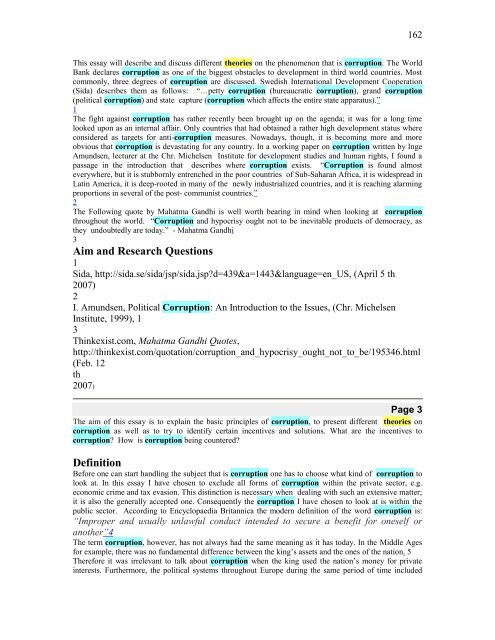FILSAFAT KORUPSI - Direktori File UPI
FILSAFAT KORUPSI - Direktori File UPI
FILSAFAT KORUPSI - Direktori File UPI
Create successful ePaper yourself
Turn your PDF publications into a flip-book with our unique Google optimized e-Paper software.
162<br />
This essay will describe and discuss different theories on the phenomenon that is corruption. The World<br />
Bank declares corruption as one of the biggest obstacles to development in third world countries. Most<br />
commonly, three degrees of corruption are discussed. Swedish International Development Cooperation<br />
(Sida) describes them as follows: “…petty corruption (bureaucratic corruption), grand corruption<br />
(political corruption) and state capture (corruption which affects the entire state apparatus).”<br />
1<br />
The fight against corruption has rather recently been brought up on the agenda; it was for a long time<br />
looked upon as an internal affair. Only countries that had obtained a rather high development status where<br />
considered as targets for anti-corruption measures. Nowadays, though, it is becoming more and more<br />
obvious that corruption is devastating for any country. In a working paper on corruption written by Inge<br />
Amundsen, lecturer at the Chr. Michelsen Institute for development studies and human rights, I found a<br />
passage in the introduction that describes where corruption exists. “Corruption is found almost<br />
everywhere, but it is stubbornly entrenched in the poor countries of Sub-Saharan Africa, it is widespread in<br />
Latin America, it is deep-rooted in many of the newly industrialized countries, and it is reaching alarming<br />
proportions in several of the post- communist countries.”<br />
2<br />
The Following quote by Mahatma Gandhi is well worth bearing in mind when looking at corruption<br />
throughout the world. “Corruption and hypocrisy ought not to be inevitable products of democracy, as<br />
they undoubtedly are today.” - Mahatma Gandhi<br />
3<br />
Aim and Research Questions<br />
1<br />
Sida, http://sida.se/sida/jsp/sida.jsp?d=439&a=1443&language=en_US, (April 5 th<br />
2007)<br />
2<br />
I. Amundsen, Political Corruption: An Introduction to the Issues, (Chr. Michelsen<br />
Institute, 1999), 1<br />
3<br />
Thinkexist.com, Mahatma Gandhi Quotes,<br />
http://thinkexist.com/quotation/corruption_and_hypocrisy_ought_not_to_be/195346.html<br />
(Feb. 12<br />
th<br />
2007)<br />
Page 3<br />
The aim of this essay is to explain the basic principles of corruption, to present different theories on<br />
corruption as well as to try to identify certain incentives and solutions. What are the incentives to<br />
corruption? How is corruption being countered?<br />
Definition<br />
Before one can start handling the subject that is corruption one has to choose what kind of corruption to<br />
look at. In this essay I have chosen to exclude all forms of corruption within the private sector, e.g.<br />
economic crime and tax evasion. This distinction is necessary when dealing with such an extensive matter;<br />
it is also the generally accepted one. Consequently the corruption I have chosen to look at is within the<br />
public sector. According to Encyclopaedia Britannica the modern definition of the word corruption is:<br />
“Improper and usually unlawful conduct intended to secure a benefit for oneself or<br />
another”4<br />
The term corruption, however, has not always had the same meaning as it has today. In the Middle Ages<br />
for example, there was no fundamental difference between the king‟s assets and the ones of the nation. 5<br />
Therefore it was irrelevant to talk about corruption when the king used the nation‟s money for private<br />
interests. Furthermore, the political systems throughout Europe during the same period of time included

















